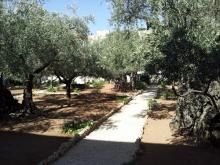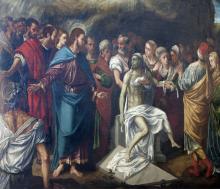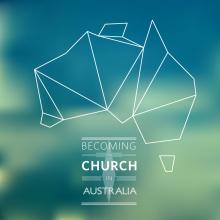Jesus

When I was a child, my vision of heaven was riddled with roller coasters and populated by Disney characters. Let me explain.
Growing up in Puerto Rico, the American “mainland” to our north was for me a dreamland of sorts. You could catch a glimpse of it on television show depicting Main Streets lined with impressive trees. And of course, there was Disney World. As a five-year old visiting Florida for the first time, I imagined that the rest of the country was just like that particular corner of Orlando that we tourists saw.
That was heaven on earth for the five-year-old version of me. Heaven was earthly and joyful and fun and sweet. But as we all know Disney is no paradise. I don’t expect long lines, lots of sweat, and expensive but mediocre food in heaven.
When I was five, Disney was my vision of heaven. As I grew up in the church, my vision turned upward. Heaven was an eternal destination deferred until the moment after you die. Heaven was a place of reward and eternity. Heaven was an ethereal experience, something so otherworldly that the best we could do was speak in metaphors and images about it. Heaven, in short, had very little to do with the world as we knew it.
Neither vision gets it quite right.

Dear church,
Let me start off this letter by expressing my deep love and appreciation for you. I have been an active participant in the community of faith for about 10 years now, and I have been profoundly blessed, cared for, loved, and inspired to be a better human being through you. I have also seen — and even participated in — some of your ugliest and most unfaithful moments in recent history. But through all of these experiences, nothing but utter appreciation and love remains for you. I believe, in the words of Bill Hybels, that the church is the hope of the world. I believe in your great power and potential to renew and reconcile our broken world through the way of Jesus. I believe that you can do it. That we can do it, together.
With that said, there has been a lot of talk recently about your impending death. For a long time, I believed the hype. I saw the numbers of millennials who were walking away from the churches and both mainline and evangelical churches closing their doors. I was convinced that maybe the church had truly seen the end.
But I was recently reminded that what we have been witnessing in the West is not, in fact, the death of the church at all.

In my Santa Barbara, California neighborhood, which we sometimes call “Leave it to Beaver Land” for its seeming serenity and peace, a new practice has become evident: Children no longer walk alone to our neighborhood elementary school. Every morning, a parade of mothers and fathers accompany their children the short distance to school, dogs in tow and cellphones in hand. It looks like the practice of safety, but it’s also the practice of fear. You just never know. It could happen anywhere. It could happen here.
These parents know about something we call “school incidents.” They know the statistics about the number of American children that are shot, stabbed, and killed in our schools each year. Like the rest of us, they know about the big ones, from Columbine to Newtown to Chicago to Pittsburgh, and they know there are so many more stories that never make it to CNN.
The soundtrack for the story of childhood in America reverberates with gunfire and the sobs of stunned classmates and grieving parents. It’s the soundtrack of fear.
Fear is our newest neighbor, even in sunny “Leave it to Beaver Land.”

At 6:23 p.m. yesterday, the state of Oklahoma initiated its effort to kill Clayton D. Lockett. Twenty minutes later, after being declared unconscious by a physician, Lockett cried out, "Oh, man," writhing in pain. Addled by this unexpected display of pain, one of the executioners said, "Something’s wrong." Soon after, the window to the observation room was covered and media were escorted out of the room.
A state official later reported that Mr. Lockett died of a heart attack at 7:06pm.
The fact that this unexpected scene was preceded by months of arguments by lawyers about the constitutionality of resuming executions in Oklahoma guarantees that a debate about the death penalty will ensue. Those who have argued that this ultimate form of punishment is "cruel and unusual" will make last nights scene their case in point. The Governor of Oklahoma has already declared that a thorough investigation of what went wrong will take place before any other executions go forward. Privately, in conversations at home and on their computers, many will say, "Did he suffer? Sure. But why shouldn’t he after what he did." Most national polls show that support for vs. opposition to the death penalty is about 50/50. Both sides will have plenty of people to argue.
But I think it would be the greatest of tragedies if we did not notice that what happened in Oklahoma last night reveals perhaps our deepest national self-deception — that, no matter what goes wrong, we will fix it because we are in control.

Society has an affinity for death. There is a pervasive fascination with (im)mortality. We appreciate life, but we are seduced at the intricacies and unknowns of death. While there is much enjoyment and celebration over health, personal accomplishments, births, and birthdays, women and men around the world ponder the “what ifs” concerning the end of life. The thought of death grips us with a “thanatopsis” like inquisitiveness — no fear just sheer curiosity.
Look at the ubiquitous commentary on demise and dying. The Walking Dead has become one of the most highly watched shows. Along with True Blood, Cold Case, and Resurrection television is replete with musings over death and what happens when the “dead” come back to life. Don Piper’s 90 Minutes in Heaven and the book-turned-film Heaven is for Real challenge us to discard any sense of reason or rationale when it comes to what many of us living have not experienced personally — that is dying. Yes, we have gone to funerals, but dare I say we were not in the casket.

Like many people, I was troubled when I heard about the recent shooting outside of a Jewish community center in Overland Park, Kansas. According to several news accounts, the perpetrator — Frazier Glenn Cross — yelled, “Heil Hitler” at onlookers as he was being carried away in a police car. Cross also has a long history of anti-Semitic behavior and has publically declared a hatred of all Jews.
In addition to being troubled by this act of hatred and violence, I was also troubled by the quick response of CNN Belief Blog Co-Editor, Daniel Burke, who made it a point to emphasize that Frazier was not a Christian but rather allegedly an adherent of Odinism, a “neo-pagan” religion which, according to Burke, “has emerged as one the most vicious strains in the white supremacist movement.”
While the annals of Christian history — ancient and modern — are full of accounts of violence perpetrated in the name of Christianity, my objective here is neither to defend Odinism nor to criticize Christianity. Instead, I want to highlight the socially constructed nature of beliefs and beliefs systems and emphasize how these socially constructed beliefs say far more about us than they do about the “gods” we claim to accept or reject.

The seasonal items aisle in the grocery store is a work in progress. Stuffed bunnies are being replaced by garden gnomes. Cans of sunscreen will soon inhabit the shelves that displayed egg-coloring kits a few days ago.
Easter is over.
Well, not completely. Boxes of purple and yellow Peeps are stacked on clearance tables in the middle of the aisle. Chocolate rabbits are available for half-price.
And tombs are being emptied.

“On the third day, he rose again.”
But how that statement is interpreted is the source of some of the deepest rifts in Christianity — and a stumbling block for some Christians and more than a few skeptics.
Did Jesus literally rise from the dead in a bodily resurrection, as many traditionalist and conservative Christians believe? Or was his rising a symbolic one, a restoration of his spirit of love and compassion to the world, as members of some more liberal brands of Christianity hold?

In the Garden of Gethsemane, Jesus utters his agonizing prayer, “Abba, Father, for you all things are possible; remove this cup from me; yet, not what I want, but what you want.”
Who among us hasn’t found ourselves in a situation where the inevitable seems impossible? Where the unavoidable seems unimaginable?
Who hasn’t said to God, in so many words, “Remove this cup”?
The most difficult thing in such a situation may be its crushing inevitability. You want to escape from your life, which suddenly feels like an oncoming train about to run you down. It is the shock you feel when you receive a frightening diagnosis from your physician. When you are laid off from a job. When a friend dies. When a relationship ends. You say to yourself, “This cannot be happening.”

Easter Sunday marks the holiest, most exalted moment of the Christian year. In Easter services all over the world, trumpets and organs blast. Flowers transform churches with their brightness. Worship leaders boldly proclaim: “Christ is risen!” Congregations echo back: “Christ is risen indeed!” The cycle of celebration and repetition begins as it should — a festive proclamation of good news. In Christ God has overcome the powers of sin and death, freeing us to live with hope and promising us life. Not just life after death, but full life, divinely inspired life — life in the here and now.
Christ is risen! Christ is risen indeed!
Even in these festive moments, many people express insecurity regarding the quality of their own believing.

Feeling anxious about your tax liability as April 15 nears? The Bible has many references to taxes that will sound strangely relevant at this time of year — beginning with the story of David and Goliath.
Many remember a teenage boy offended by insults thrown by a giant foe against his nation and God himself, who volunteers to go into battle with a slingshot. But did you know that a tax incentive was part of his prize?
Visiting the battlefield, David learns: “The king will give great wealth to the man who kills (Goliath) and will exempt his family from taxes in Israel,” (1 Samuel 17:25).
Throughout Scripture, tax discussions mark many passages, as ancient men and women worried about how they would pay.

The bouncers proceeded to look us over exactly one time. No more. No less. Upon making their assessment, we were informed the club didn't cater to our type. I guess a green v-neck shirt, cammo shorts, and sandals didn't appear affluent enough to afford anything the club had to offer. In their defense, their assessment was spot on.
On the trek back to our hotel, at the opposite end of the strip, I had a good deal of time to think about what had transpired. That's when it dawned on me, our churches operate a lot like that night club.
Allow me to explain.
For starters, the church thrives on exclusivity. As an institution, it spends an awful lot of time and energy differentiating between the "in" and the "out."

Editor's Note: This post is adapted from a sermon preached by the Rev. Dr. Randle R. (Rick) Nixon.
Some of us have stood at a tomb, faced an open grave, scattered the ashes of one beloved. We know what it’s like to be confronted with the stark reality of death and the flood of conflicting emotions that comes with it. I’ve stood at different sites at Dry Creek Cemetery in Boise, Idaho, and the Veteran’s Cemetery next to it, to bury my father, my brother, my nephew, my step-father and-step sister, my brother-in-law, not to mention my beloved piano teacher, and a dear high school friend. Not so long ago I stood by the open grave of Patrice Heath as her casket was lowered into the ground. We prayed and wept and celebrated her life, but it is not an easy thing, under any circumstances, to lay a loved one to rest.
The ancient story of Lazarus being raised from the dead in John 11:1-45 is just such a situation. It’s also another occasion to encounter Jesus in his divinity and his humanity. It’s a long, complicated story. You have heard it read. I will not attempt to unpack it all.

Here’s a crash course to understand what’s happening in Australia with refugees and the politics of Jesus.
Imagine for a moment that in the lead up to the next U.S. elections, a political party changed immigration policies and took the relatively small number of people seeking safety on boats from, let’s say Cuba, and locked these persecuted people up on Guantanamo like criminals — elderly, men, women, and over 1,000 children. You would expect outcry from people across the political spectrum. Indeed there was. Only the fear campaign was so effective, the blame game so seductive and the election win so decisive, that the majority of politicians on all sides sacrificed their principles on the altar of popularity. Not to mention these desperate people — tired, poor, huddled masses yearning to breathe free — … these now homeless who were literally tempest-tossed on boats sacrificed on this bloody idol of false security. Of course behind closed doors, elected officials will confess to you, as a Christian, that they personally find it abhorrent but for the sake of the party and all the good they could do when they get into power they rationalize with the logic of Caiaphas and get the same results: the sacrifice of the innocent.
Sound too far-fetched? This is the recent history of Australia. Thanks, Paul Dyson, for the Cuba analogy.


Have you ever noticed that society allows fans to do things that, short of fandom, we would deem absolutely crazy? When do grown adults have permission to paint their faces with logos except on the day of the big game? When is hugging perfect strangers acceptable? After a 3-point shot of your favorite team beats the buzzer, it’s expected. Screaming at the top of our lungs is perfectly acceptable when we’re in a crowd of thousands doing the same.
March Madness wraps up this week and a tournament champion will be crowned. Whatever the outcome of Monday’s championship game, we can guarantee that there will be screaming crowds at AT&T Stadium in Arlington, Texas. (The final may break the record of largest crowd ever to attend a NCAA basketball game with 75,421 attendees.)
Crowds change social norms. Whether they are for sport, political protest, or public worship, gathering with thousands inevitably changes our mood and actions. I have never felt as alone as in a rival team’s stadium filled with thousands of home-team fans. I rarely feel as important as when I’ve gathered with others to protest unjust laws or call for social action. I get Goose bumps when I’m able to recite the Lord’s Prayer with a few thousand other worshipers.
Next Sunday, April 13, 2014, is known as Palm Sunday. Around the world Christians will gather to wave palm branches.

THERE IS NO controlling a story once it’s out. Even in the times before cell phones, the internet, and Twitter, news traveled a similar route through participants, eyewitnesses, and those with the privilege to eavesdrop upon rumors and reports. Details get scattered, but the facts stand out. Many stories can be told about who, when, and how the story leaked. But all those specifics remain secondary to the spectacular announcement. For example, in 1903, how did The Virginian-Pilotscoop other newspapers to be the first to cover the beginning of the aviation age? No one really knows. Orville and Wilbur Wright believed their hometown Dayton newspapers should make the announcement. Indeed, on Dec. 18, the day after the first flight, the Dayton Evening Heraldreported the news—directly based on a telegraph sent by Orville Wright. But three other papers had already reported this world-changing occasion based on TheVirginian-Pilot’s story. Though filled with inaccuracies, the original accounts correctly announced the single important fact: There had been a flight!
Two thousand years earlier, the witness of a few women called forth centuries of testimonies that describe a progression from lack of recognition to full recognition of Jesus the person, as well as the significance of his death and resurrection. The cross and the empty tomb are not self-explanatory; they require interpretation. On the other side of the Lenten journey, Easter provides opportunities for the church to reflect on the biblical witness concerning the rumors of the resurrection. These texts highlight not only the necessity of interpretation, but also the sources and shape of valid interpretation.

IS IT WRONG for a Christian to pray to Allah? When a Muslim worships Allah, is she worshiping God?
Questions like these have arisen with more urgency than usual in the months since a Malaysian lower court ruled in October that the word “Allah” was exclusive to Muslims and therefore the Herald, a Malay Catholic newspaper, could not use the word “Allah” in print. (The decision is currently under appeal.)
Many Christians lament the lower court’s decision. They see it as an infringement on the rights of religious minorities. But other Christians welcome the ruling. They claim that it actually helps Malaysian Christians by protecting them from confusion and preventing them from making a grave mistake.
For example, Albert Mohler, president of Southern Baptist Theological Seminary here in the U.S., has argued that Christians should not call upon the God of the Bible using the word “Allah,” because “Allah” refers only to the god of the Quran, a god who is radically different from the true God of Jesus Christ.
Whether Mohler and those who agree with him are right carries dramatic implications. If they are, then prospects for respectful, trusting cooperation between Christians and Muslims are slim. There is one and only one God. If Christians believe that Muslims do not worship that God, then we must believe that Muslims worship nothing, an empty, created idol, or else something demonic. The claim to worship the one and only God is one of the most central claims of Islam. No matter how respectfully a Christian denied that claim, it would be difficult for most Muslims to receive that rejection. Mutual respect is an important ingredient in public cooperation. Thus cooperation between Christians and Muslims would be impeded. Even more disconcertingly, if the bulk of Christians held, as some do now, that Muslims actually worship a demonic force, then those Christians would have compelling reasons not to cooperate with Muslims. To do so would be to cooperate in opposition to God.

“Christianity” is often used to manipulate, control, shame, judge, and hurt others. It’s influenced by politics, popularity, wealth, success, pride, hate, fear, selfishness, and a desire for power. The poisoning of our beliefs — or theology — happens subtly, under the pretense of tradition, teaching, education, discipline, authority, respect, and religion.
We often treat theology similar to politics, where our beliefs and doctrines are based on which ones benefit us the most.
We strive to get everything we can from our faith, and this can lead to spiritual narcissism, where we become obsessed with maximizing the benefits for ourselves while withholding them from others.
Rarely do we adhere to — or agree with — theological ideas that benefit someone else more than us. Sacrificing our own comforts for the sake of others is absurd — which leads to a sense of divine favoritism.

A “fringe hatemonger” — that’s what I called Fred Phelps in a letter to the editor of The Washington Times in 1999. In response he announced in a news release that he was coming to Colorado Springs to protest the “… false prophet James Dobson and his fag-infested Focus on the Family scam.”
It also challenged my immature understanding of theology. “What if Phelps is right?” I worried. I buried these thoughts for years — though truth be told, they’d surface at nearly every mention of his name.